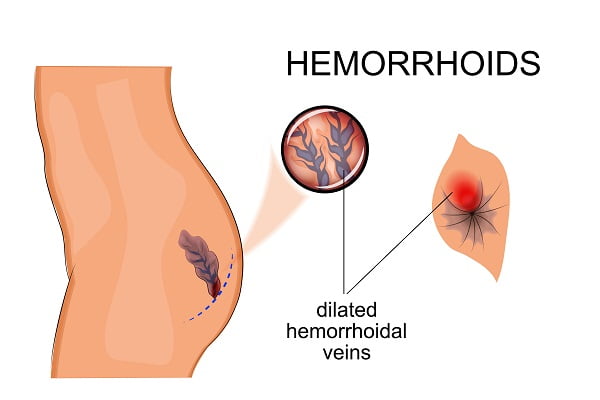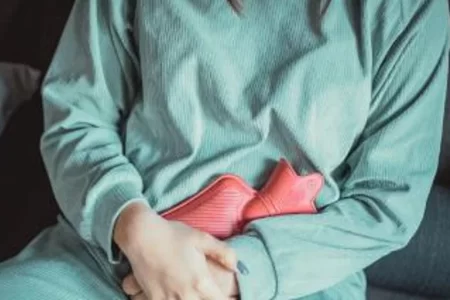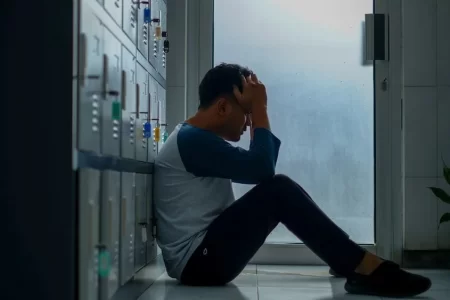What Are the Causes and Risk Factors of Hemorrhoids?
- Updated on: Jun 12, 2024
- 4 min Read
- Published on Oct 2, 2019

Hemorrhoids are not a result of one day. Instead, persistent pressure and repeated straining of anal muscle during bowel movement cause hemorrhoids (piles) which cause the veins present in the anal wall to increase in size and sometimes protrude out of the anal opening.

This is often due to constipation or diarrhea. Pressure so exerted gets in the way of blood flow in the veins which results in pooling of blood and swelling of veins. When the veins around the anal opening are dilated with blood, the person gets hemorrhoids.
Inflammation in hemorrhoids weakens anal muscles and causes sagging of tissue. This sagged tissue, later, bulges out of the anus.
Pregnant women are at high risk of developing hemorrhoids because of pressure exerted by developing fetus. The reason for increased pressure may vary with person to person.
Causes of hemorrhoids
The reason for why changes in the veins within the lining of the rectum occur and lead to hemorrhoid swelling is not clear yet. Sometimes piles seem to develop for no apparent reason. Following are some common reasons that may possibly cause hemorrhoids:
Strain during bowel movement
This is the main reason for a hemorrhoid is putting too much strain during bowel. This pushes blood into rectal veins and arteries. This ultimately causes swollen veins which are later pushed against the anal walls. Hemorrhoids result in weak and feeble anal muscles. Weak muscles then bulge out of anal walls.
No Stool or excessive stool
People having constipation and diarrhea are more likely to suffer from hemorrhoids. In constipation, it becomes tough to eject stool out of the anus, as the stool is large and hard. This results in swelling of nerves in rectal region.
Diarrhea means excessive bowel and straining of muscles. This can sometimes even rupture the nerves. Rupturing of hemorrhoids causes bleeding that worsens with time. A person feels extreme pain in this condition.
Sitting in toilet for too long
Some people have a habit of sitting in washroom for quite a long time which is not a good sign. Sitting for too long in washroom without any reason can cause excessive blood to be pumped into rectal veins. This leads to swollen veins which later protrude out of the anal wall.
Sitting and standing jobs
A job that needs sitting or standing for longer period makes a person susceptible to hemorrhoids. Sitting for too long exerts a pressure on buttocks which increases the risk of piles.
The concern with standing jobs is that they push blood down to lower portion of the body that results in swollen veins. Excess of standing as well sitting is reported to cause inflammation of hemorrhoids.
Overweight
Obesity is the root cause of many diseases including hemorrhoids. Excess of body weight tends to put more pressure on the muscles of anal wall. As a result, nerves protrude out of the anal layers causing swollen hemorrhoids.
Low-fiber diet
Malnutrition or taking diet low in fiber can also cause swollen hemorrhoids. Low-fiber diet causes constipation that strains bowel movement.
Junk food and spicy foods with lower intake of fluids also lead to bulging out of nerves from the anal wall.
Piles due to pregnancy
Pregnancy can be another reason for hemorrhoids. Enlarged uterus and fetus are likely to increase pressure on rectal veins causing them to swell.
Pregnancy also restricts women from physical activity that is another factor for hemorrhoid swelling. In addition, hormonal changes in pregnancy weaken the muscles supporting rectum and anus.
Aging and Hereditary
Hemorrhoids are commonly reported in people above the age of 45 years. As the age of person increases, the muscles in anus become less supportive. This causes nerves to bulge out and leads to inflammation.
Some people inherit this disease from their parents and family. The disease is directly not inherited. However, due to hereditary, some people have weak walls of veins present in anal region.
Anal intercourse
Anal intercourse can worsen the already existing piles as it exerts pressure on rectal walls.
Other reasons
The main reason for piles or swollen hemorrhoids is putting too much strain on the anal wall. Other factors that put excessive pressure on rectal area are:
- Persistent chronic cough
- Lifting very heavy weight
- Sneezing and vomiting
- Holding breath for too long while lifting something
- Colon cancer
- Past rectal surgery
- Spinal cord injury
- Lack of erect body posture
It is reported that people develop piles at some or the other stage of their life. Even after so many achievements in healthcare, people still suffer from piles and struggle with pain and discomfort.
To reduce the cases of hemorrhoids, it is necessary to understand what the triggering factors are. This can help in better dealing with the condition. Timely detection and diagnosis are important for proper healing process. Read about diagnosis of hemorrhoids.
What are the risk factors for hemorrhoids?
Men and women are equally at risk of developing hemorrhoids. However, people within the age group of 45-65 years more prone to the disease.
Hemorrhoids are not life-threatening but can be extremely painful. A little care about your eating habits can help you avoid this disease.
Following are the risk factors that increase the risk of developing piles:
- Low-fiber diet
- Pregnancy
- Heavyweight lifting
- Any other factor that strains anal muscles
With improvement in health industry, it is possible to treat hemorrhoids with proper care and medication. Read about treatment of hemorrhoids.












